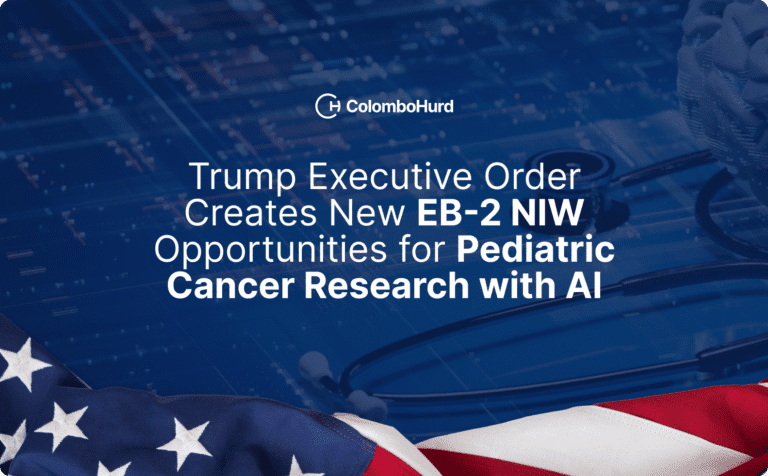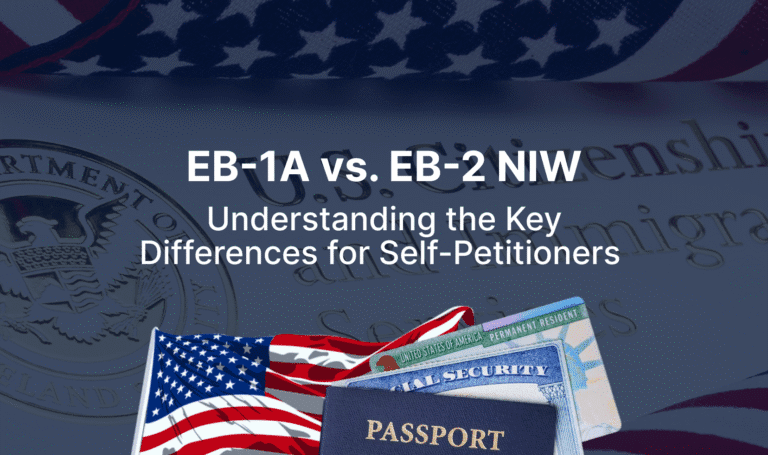For finance professionals, economists, compliance specialists, and fintech innovators, President Trump’s recent Executive Order, “Guaranteeing Fair Banking for All Americans,” (signed August 7, 2025), provides a powerful new tool to strengthen EB-2 National Interest Waiver (NIW) petitions. Rather than simply being a policy development in isolation, this order creates a clear opportunity for professionals in the financial sector to connect their expertise to a recognized matter of national importance, fair and equal access to banking.
The order highlights the federal government’s priority to end discriminatory debanking practices and expand fair banking access nationwide. For EB-2 NIW applicants, this creates a direct pathway to frame their work as advancing U.S. national interests. By showing how their contributions in areas such as risk management, compliance, digital payments, financial inclusion, or capital market innovation support the goals of this Executive Order, finance professionals can present a compelling case for why their skills are not just valuable but essential to the United States.
Why This Executive Order Matters for EB-2 NIW
The EB-2 NIW allows individuals with advanced degrees or exceptional abilities to bypass the labor certification process if their work benefits the United States. A central requirement is demonstrating that the petitioner’s proposed endeavor has substantial merit and national importance.
The Fair Banking Executive Order directly supports this requirement by addressing critical issues such as ending discriminatory debanking practices and ensuring equal access to financial services. Finance professionals who can connect their achievements to these priorities will be well-positioned to strengthen their petitions and stand out as leaders whose work directly benefits the United States.
Colombo & Hurd Immigration Attorney Aaron Labreque explains why these priorities matter:
“The heart of this Executive Order lies in public trust. It ensures that America’s financial institutions operate with fairness and accountability so that individuals and businesses who bank with us can do so with confidence that their financial security remains protected. To that end, this order expands access across a broad range of individuals and communities, solidifying the principle that a robust and reliable financial infrastructure serves the national interest of the United States.”
Opportunities For Financial Professionals
To create a compelling EB-2 NIW petition, professionals can showcase how their work contributes to areas such as:
- Transparency and compliance in banking activities and systems
- Innovation in fintech and open banking technologies
- Risk management and fraud prevention to strengthen financial stability
- Expanded access to capital for small businesses and individuals
These contributions directly align with the EB-2 NIW’s national importance prong.
Demonstrating National Importance
To meet the EB-2 NIW’s “national importance” requirement, professionals should frame their work in ways that reflect the goals of the Executive Order. The Executive Order underscores that access must be supported by confidence in U.S. financial systems. For EB-2 NIW petitioners, this creates a direct pathway to present their projects as endeavors that advance transparency, compliance, innovation, and ultimately public trust.
Examples include:
- Ensuring regulatory compliance with laws like the Equal Credit Opportunity Act and preventing politicized lending practices
- Developing financial products that expand access to credit, loans, and insurance
- Creating open banking APIs and technologies that increase transparency and efficiency
- Reducing illicit financial activities and enhancing trust in U.S. financial institutions
- Promoting alternative finance models that expand inclusion for individuals who avoid traditional systems
These endeavors highlight how finance professionals contribute to economic fairness, opportunity, and long-term U.S. prosperity.
Key Questions About EB-2 NIW and Fair Banking
The order highlights the federal priority of strengthening the infrastructure behind financial services so that banking decisions are based on objective, risk-based standards rather than politicized factors. For EB-2 NIW petitioners, this creates an opportunity to show how their work, such as in developing fintech products, compliance frameworks, or financial technologies that can lead to equal access, supports these goals. The focus of the Executive Order is on building the systems and tools that make fair and transparent access possible.
Banking specialists, fintech developers, economists, compliance professionals, fraud prevention experts, and financial inclusion advocates can all build EB-2 NIW cases tied to this policy priority.
Petitioners typically need an advanced degree or exceptional ability. Colombo & Hurd has represented professionals with backgrounds ranging from economics to engineering whose work clearly advanced U.S. financial fairness.
Projects that expand access to banking activities, reduce discriminatory practices, promote transparency, enhance financial inclusion, or strengthen compliance align closely with the priorities identified in the Executive Order. In addition, initiatives that restore public trust in U.S. banking institutions, whether through improved risk management, fraud prevention, or the creation of fair and reliable financial products, also fit directly within the national interest recognized by the policy.
EB-2 NIW Success for Professionals Advancing Access to Fair Banking and Financial Services
Colombo & Hurd has secured EB-2 NIW approvals for professionals worldwide whose endeavors strengthen financial fairness and inclusion in the United States. Recent examples include approvals for the following professionals:
Brazilian Manufacturing Engineering Professional
Our client, a professional from Brazil with a background in engineering and IT, aimed to improve the transparency of U.S. financial services by broadening access to loans, insurance, and payment systems. By developing open banking Application Programming Interfaces (APIs) and training IT talent, he contributed to greater efficiency and accessibility within the financial sector. His work helped expand financial access for individuals and small businesses that traditionally face barriers, directly aligning with U.S. priorities to ensure fair banking access. Because these initiatives promote both inclusion and technological innovation in the U.S. economy, the endeavor has national importance and the client qualified for EB-2 NIW.
Political Scientist from Turkey
This client from Turkey pioneered initiatives to establish an interest-free financial system, designed to expand opportunities for individuals who avoid traditional banking models. His work created new channels for investment and credit access, integrating populations previously excluded from the U.S. financial system. By bridging the gap between value-driven investors and mainstream financial institutions, his project expanded choice and inclusion in the marketplace. By developing alternative, lawful financial frameworks to advance fair access for diverse communities, this client effectively demonstrated the national importance of his work and secured EB-2 NIW approval.
Colombian Economist and Systems Engineer
With their academic background in economics and computer systems, this Colombian professional designed cutting-edge analytics models for credit-granting institutions. His models directly expanded access to credit in rural, underbanked, and unbanked regions, improving financial stability for populations often excluded from traditional services. By supporting fair lending in distressed communities, his work addressed one of the clearest national priorities outlined in the Executive Order. USCIS recognized the endeavor as one that directly supports national efforts to expand access to financial services, granting EB-2 NIW approval for this professional creating pathways to capital for underserved Americans.
Business Administration Professional from Singapore
Another client, a professional from Singapore, worked on integrating generative artificial intelligence (AI) into financial advisory services, with a special focus on democratizing access for underserved institutions. By supporting community banks, credit unions, and independent financial advisors, his work brought professional financial planning tools to millions of Americans who previously lacked access. His project empowered smaller institutions to compete with large firms, expanding opportunities for families and businesses in local communities. The EB-2 NIW petition emphasized how democratizing financial guidance strengthens inclusion within the financial system and demonstrated how innovation in financial technologies can promote fairness and inclusion across the financial landscape.
Accountant from Turkey
This Turkish professional, with a Ph.D. in accounting, focused on reducing illicit and fraudulent financial activity while improving asset use efficiency. His efforts not only increased trust in U.S. financial institutions but also safeguarded vulnerable populations from unfair practices. By strengthening compliance frameworks and financial literacy, his work supported a healthier financial environment that ensures equitable access to legitimate banking services. USCIS approved this petition, which underscores the value of fraud prevention and transparency as essential to expanding fair banking access nationwide.
Organizational Leader from Nigeria
Our client applied leadership and analytics expertise to improve the efficiency and financial health of small and mid-sized banks in the U.S. By utilizing planning and analytics tools, providing leadership training, implementing strong operational controls, and offering expert financial advice, he strengthened institutions that often serve underbanked communities. His work ensured that smaller financial institutions remained competitive, resilient, and able to provide broad access to financial services. USCIS approved the EB-2 NIW petition based on the national importance of safeguarding community banking.
Conclusion
Trump’s Executive Order on “Guaranteeing Fair Banking for All Americans” identifies new areas for finance professionals to pursue the EB-2 NIW Green Card by demonstrating how their work in financial inclusion, transparency, compliance, or security supports U.S. priorities. By aligning their endeavors with the national priority of fair banking access, professionals can demonstrate how their work strengthens U.S. financial systems, promotes equity, and advances long-term economic growth, and therefore qualifies as nationally important.
If your work in finance, banking, or fintech contributes to fair access, transparency, or inclusion, this may be the right moment to begin your EB-2 NIW process.




